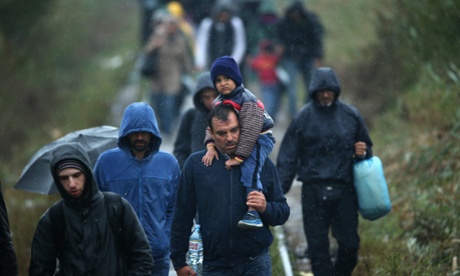Denmark’s attempt to return hundreds of Syrians to Damascus after deeming the city safe will “set a dangerous precedent” for other countries to do the same, say lawyers who are preparing to take the Danish government to the European court of human rights (ECHR) over the issue.
Authorities in Denmark began rejecting Syrian refugees’ applications for renewal of temporary residency status last summer, and justified the move because a report had found the security situation in some parts of the country had “improved significantly”. About 1,200 people from Damascus currently living in Denmark are believed to be affected by the policy.
Guernica 37, a London-based chambers which provides pro-bono and affordable assistance in transnational justice and human rights cases, is working with asylum lawyers and affected families in Denmark to mount a challenge to the government policy under the Geneva convention principle of “non-refoulement”. Neither the UN nor other countries deem Damascus as safe.
“The situation in Denmark is deeply concerning. While the risk of direct conflict-related violence may have diminished in some parts of Syria, the risk of political violence remains as great as ever, and refugees returning from Europe are being targeted by regime security forces,” Guernica 37’s strategy note reads.
“If the Danish government’s efforts to forcibly return refugees to Syria is successful, it will set a dangerous precedent, which several other European states are likely to follow.”
Denmark is home to 5.8 million people, about 500,000 of whom are born abroad and 35,000 are Syrian. In recent years, however, the Scandinavian country’s reputation for tolerance and openness has been affected by the rise of the far-right Danish People’s party.
Observers say the new stance on Syrian refugees – which also applies to refugees from other countries, although their numbers are smaller – is an attempt by the centre-left coalition in government to win back votes.
Since Denmark does not have diplomatic relations with Bashar al-Assad’s regime, Syrian refugees whose residency renewals are denied face the prospect of being held indefinitely in detention centres.
And in a cruel quirk, because the Danish authorities recognise that Syrian men are at risk of being drafted into the military or punished for evading conscription, most of those affected appear to be women and older people, many of whom face being separated from their families.
Ghalia, a 27-year-old who was reunited with her parents and brothers when she arrived in Denmark in 2015, had her residency permit revoked in March. She is the only member of her family to be affected.
While Ghalia is appealing against the decision, the uncertainty and worry of being separated again have left her unable to sleep, she said.
“I feel nothing but fear about going into the immigration centre by myself, but I can’t return to Syria … it is like they believe we have a choice but if I go back, I will be arrested. You can’t do anything in the immigration centres, you can’t work, you can’t study. It’s like a prison. I’ll just waste my life away in there.”
Carl Buckley, the barrister leading Guernica 37’s efforts, said taking a case to the ECHR in Strasbourg is one of several potential avenues affected Syrians could turn to if they exhaust the appeals procedure in Denmark.
He said: “The ECHR is a slow-moving system, but we would make an application asking the court to consider interim measures, which would involve ordering Denmark to stop revoking residencies until a substantive complaint has been considered and ruled upon.
“In theory that could happen pretty quickly. And while it would only apply to one individual’s case, we would hope that Denmark would consider it carefully or they will end up with thousands of similar applications.”
Guernica 37 and a consortium of 150 Danish law firms working on asylum cases are hopeful it will not be necessary to take the Danish government to the courts.
Faeza, 25, a nurse working in the northern town of Hillerrød, was treating Covid patients when Denmark’s immigration services invited her for an interview in August last year. “I was interviewed for eight hours. I was asked over and over, why hadn’t I returned to Syria? I said because it wasn’t safe.”
Her permit was revoked in January of this year and she spent many stressful months appealing against the decision: like Ghalia, Faeza was the only person in her family who’d had their permit revoked. While the ruling was overturned in July, she remains terrified of being questioned again and the prospect of returning to Syria alone. “I am happy at the decision,” she said, “but I am now worried [in case it happens again]. As Syrian refugees, we are subject to unjust decisions.”
Jens Rye-Andersen, an Aalborg-based immigration lawyer, said that he believes the rate at which residency permits are being revoked has slowed as a result of widespread criticism from the UN, human rights groups and the Danish public.
“I think the government is listening to us, and I hope that they will drop the plans for the time being,” he said.
“There have been a lot of changes in the asylum system in the last two years and clearly it’s not working very well. Experts who compiled the initial report the government used to show the security situation in Syria has improved are saying that their work has been misquoted. So I think the government doesn’t have a choice except to reconsider.”
In 2018, hundreds of Somalis in Denmark had their permits revoked under a similar scheme. Some won their appeal to stay but, according to the Danish Refugee Council, many left Denmark and have disappeared, possibly to live without status in another country.
For Ghalia, whose appeal court appointment has been delayed because her lawyer was sick, the waiting is agony.
“I’m right back to that point when I first arrived in Denmark and feel helpless all the time,” she said.
“I have no control over my life and I feel like I haven’t done anything to deserve this.”













